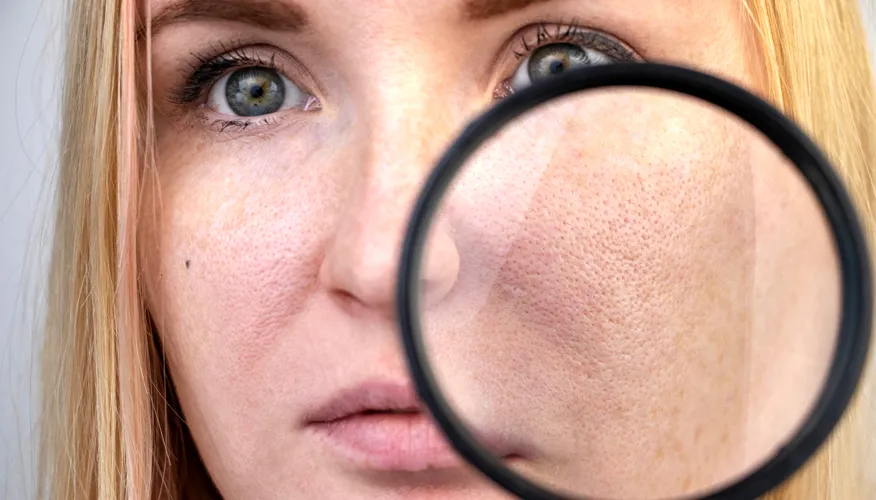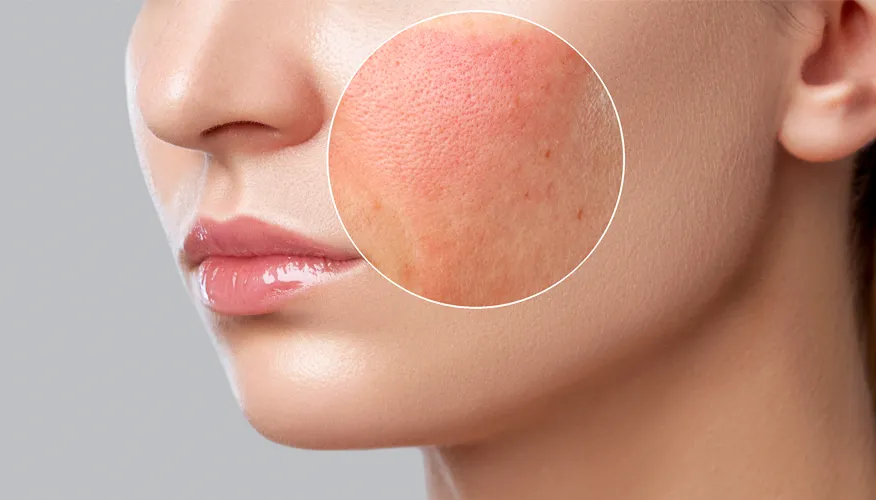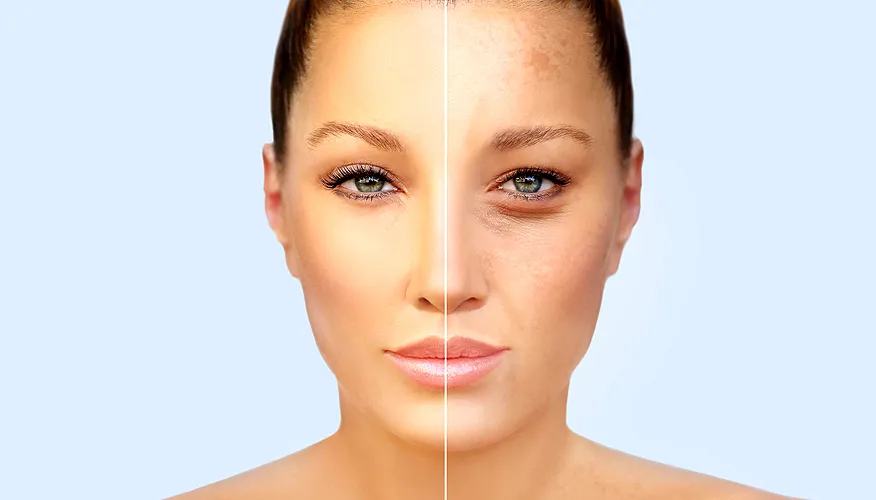Is Wearing Makeup Bad For Your Skin?
Key Highlights
- Makeup effects on the skin are not entirely due to daily use but depend on product choices and skincare practices.
- Regularly using products with harsh, toxic makeup ingredients cause dryness and premature aging while failure to cleanse thoroughly can lead to clogged pores and skin irritation.
- Removing makeup before bed, cleaning makeup tools, and regularly checking product expiration dates, can reduce the negative effects of makeup and maintain healthy, radiant skin.
A dab of concealer and blush, a swipe of your eyeliner, and a touch of lipstick have all become part of our daily routine, especially for those who love putting on beautiful makeup before heading out for their day. But the regular use of these cosmetic products raises the question, is makeup bad for your skin?
Let’s start by understanding that anything you apply on your skin, be it face wash, serums, creams, or sunscreen, can affect your skin - positively or negatively. The same goes for makeup. But the extent of makeup’s effects on skin depends entirely on the type of products used, the techniques, and the skincare regimen you follow. If any of these factors don’t match your skin type, then the negative effects of makeup will appear.
Does wearing makeup daily have adverse effects on your skin?

As mentioned above, daily use of makeup doesn’t affect your skin as much as bad makeup habits do. If you choose products that contain harsh chemicals, then regular use can cause damage to your skin. The toxic ingredients in cosmetics like these can break down the protective barrier on your skin and penetrate the pores, causing dryness or irritation.
On the other hand, if you do not cleanse your skin properly after wearing makeup, then these toxic makeup components remain in your pores, causing horrible makeup-related skin flare-ups or breakouts. Another prominent side effect of makeup on skin, especially when applied daily, is that it interferes with the skin’s exfoliation process, temperature regulation, and ability to renew cells.
Side effects of wearing makeup regularly
Let’s take a more detailed look at how regular use of makeup is bad for your skin. These shouldn’t act as a deterrent to wearing makeup, but rather make you aware of the temporary or permanent makeup side effects so that you can start practicing some good makeup habits.
1. Clogged pores

- Makeup that is not washed completely or left too long on the skin can clog your pores. This means that there is a possibility makeup causes acne because clogged pores can lead to the formation of acne-causing bacteria.
- The clogging up by toxic makeup residues also leads to the formation of whiteheads, blackheads, and eye irritation from makeup causing bumps around it.
- The best way to tackle this is to actively look for non-comedogenic makeup when purchasing products.
2. Skin irritation and allergies

- Like all skincare products, it is important to choose products that are suited to your skin, or you will run the risk of developing skin irritations, rashes, and even full-blown allergies.
- Regular makeup is bad for your skin only when the products don’t use gentle or natural formulations.
- With chemicals like parabens, SLES, alpha hydroxy acids, fragrances, or preservatives in makeup, allergic reactions or skin irritation can be worsened.
3. Dryness and Dehydration

- Certain products promise a mattifying texture or quick dry features. But the most prominent negative effect of makeup such as this is its alcohol content which can dehydrate your skin.
- Fragrant products can also be categorized as bad makeup for dry skin and regular use can worsen eczema or other such dry and sensitive skin issues.
- Glycolic acid or salicylic acid is often added to makeup products for oily skin, but for drying skin, they can cause further dryness.
4. Premature aging

- In the context of early aging, is makeup bad for your skin? Well, it’s not makeup alone, but the type of products used and your before makeup and after makeup routine that plays a role.
- Cosmetics that contain drying agents like fragrances, preservatives, parabens, etc., can act as skin irritants and make fine lines, wrinkles, and saggy skin more prominent.
- Some choose to skip SPF before the makeup, and this bad makeup habit allows the sun’s effects to further age the skin.
- If you don’t do a complete cleanse and remove makeup at night, the toxic makeup substances left behind trap free radicals, which cause collagen breakdown in the skin.
5. Uneven skin tone

- Markers of uneven skin tone such as discoloration, pigmentation, redness, dark spots, etc., are also one of the lesser-known side effects of makeup on skin.
- The collagen breakdown that happens when makeup is left on for too long can cause discoloration in certain areas of the face.
- If pores are clogged for too long, then it can lead to several breakouts, which leave pigmentation scars on your skin.
6. Acne Cosmetica
- Literally known as acne caused by cosmetic products, this side effect of makeup on the skin occurs mostly on the face, neck, and hairline.
- It occurs due to the use of comedogenic products, which means it blocks skin pores or hair follicles, leading to the buildup of excess oil and noticeable bumps (whiteheads, blackheads, pimples) around the affected area.
- Acne cosmetica can occur even in individuals with no prior history of acne and can appear in a few days or even up to 6 months later.
7. Eye irritation

- From eyeliner and eyeshadow to concealer and foundation, there are several products applied on the eyelids and around the eyes. The use of so many products raises the question - Is wearing makeup bad for your skin around the eyes?
- As the skin here is very delicate, even the slightest irritants from harsh makeup or bacteria and germs from old, toxic makeup can cause redness, infection, eye discharge, swollen eyes, and in some very severe cases, disturbance in sight.
- Moreover, the natural bacteria on our eyelashes can transfer to the eye makeup brush and can build up even in the confines of the container it is returned to.
8. Lip dryness or chapping

- Just like the skin on your face, your lips are also susceptible to irritants in cosmetic products.
- Ingredients like dyes, fragrances, menthol or citrusy flavors, and preservatives in your products can have some severe makeup effects on the skin around the lips and the lips themselves, causing dryness and chapping.
- Drying products like matte lipsticks can further damage your skin by seeping into the cracks and rough patches, and blocking the pores.
9. Pore enlargement

- Makeup is bad for your skin only when you use harsh ingredients and chemicals that not only dry out your skin but also enhance the appearance of larger pores.
- Now, imagine these toxic makeup substances are left overnight due to a lack of proper cleansing.
- The side effect of foundation on skin, or any other makeup products, is that they can further mix with the dirt and sebum produced from the day to clog pores, causing your pores to look enlarged the next day.
10. Increased skin sensitivity

- When considering if makeup is bad for your skin, keep in mind that any of the temporary or permanent makeup side effects mentioned above can make your skin even more sensitive and prone to acne, eczema, or other issues.
- The continuous use of toxic makeup or old/expired products can strip and weaken your skin’s natural protective barrier.
- This makes it all the more susceptible to breakouts, allergic reactions, or infections when exposed to harsh or bad makeup habits like the use of products with fragrances, dyes, allergens, etc.
When can you avoid wearing makeup?

Simply wearing cosmetic products is not harmful, but in certain situations where external factors are also at play, makeup does damage your skin if not worn with caution or with proper prep.
1. When you are dealing with a breakout
- When you wake up to an angry red pimple or that dreaded breakout, you might want to try and conceal it with makeup. But beware! This can lead to more inflammation and worsens the problem.
- Plus the bacteria on your skin can get transferred to the makeup brushes or products you use, causing breakouts and other harmful makeup effects on skin.
2. When you are at the gym
- Is it bad to wear foundation every day when going to the gym? The answer is a resounding yes!
- When you indulge in any form of physical fitness, your pores open up to let out sweat. But thick layers of makeup do not allow the sweat to surface and instead let it clog the pores, which undoubtedly leads to breakups.
- While you must avoid cakey makeup, you can apply a hydrating lip product or lightweight moisturizer.
3. When you are done with a swim
- Want to apply makeup soon after a swim at the beach or pool? Think again! Makeup is bad for your skin when it is used immediately after stepping out of the water as your skin might have some dirt, chlorine, grime, or bacteria on it.
- Adding cosmetic products without thoroughly cleansing your skin can lead to bad makeup-related breakouts.
4. When you are undergoing micro-needling or laser hair removal
- During a laser hair removal procedure, you need to allow the laser to easily reach and target the hair follicles on your skin, so you have to avoid any barriers like skincare products, foundation, concealer, etc.
- After micro-needling or laser hair removal, the skin can be very sensitive. During this time, wearing makeup is bad for your skin and can hinder the healing process so it's important to go barefaced for about 48 hours.
How to prevent the side-effects of makeup on skin

1. Before you start make up
- Make sure you get your hands on makeup products that are right for your skin type.
- Do check the product label to see if it is free of allergens or harsh chemicals, and if it is formulated for dry or oily skin.
- An important face prep before makeup is to wash and clean it. This can get rid of all the dirt or skincare products remaining, to make sure your start on clean skin.
- Don’t forget to moisturize your skin and do a proper skin prep before makeup to prevent the dryness of cosmetics from affecting the protective barrier on your skin.
- Before makeup what you should apply is sunscreen, as the SPF in makeup products alone isn’t enough to block the sun from aging your skin.
2. After makeup routine
- DO NOT go to bed without first removing all your makeup.
- Almost all the negative effects of makeup are caused by leaving products to clog the pores overnight. You can do the double cleansing routine to completely remove makeup.
- Keep your brushes and makeup applicator tools clean. Try and wash them at least once a week to remove bacteria from your skin cells or sweat that can grow on them.
- Check your products regularly and throw out expired products. Old makeup is equivalent to toxic makeup and can cause rashes, allergies, and severe skin infections.
Conclusion
Let’s put a rest to the highly debated question ‘Is makeup bad for your skin?’ While good makeup is undoubtedly a confidence booster, its regular use demands caution and proper skincare practices.
Learn how to prep your skin before makeup as well as other skincare routines to follow and you can tackle clogged pores, skin irritation, and premature aging with ease. Stay away from harsh ingredients and chemicals, opt for non-comedogenic makeup, and ensure that you are giving your skin only the best!
Frequently Asked Questions
It is generally safe to wear makeup while pregnant, but you will want to stay away from certain toxic makeup ingredients, especially due to hormonal fluctuations in your body. Avoid products with parabens, retinol, aluminum powder, talc, formaldehyde, phthalates, BPA (Bisphenol A), artificial or natural fragrances, dyes, or preservatives. Look for labels that say paraben-free, fragrance-free, or ‘no sulfates and phthalates’.
Makeup wipes can be damaging as they don’t completely cleanse products from your skin, allowing the negative effects of makeup like clogged pores to build up. They also contain drying agents like alcohol, fragrances, and other harsh chemicals, which can also affect the pH balance of your skin.
One of the lesser-known side effects of foundation on skin, especially when you choose the wrong formulation for your skin type, is that it can turn dark on your skin. This is known as makeup oxidisation and happens when the oils in your makeup start to react with the air and your own natural oils, causing patches of dark skin. Avoid this makeup effect on skin by using a primer before your foundation.
Using expired makeup is a strict no as it can irritate your skin, causing redness or itchiness. In more severe cases, the bad makeup habit can also introduce toxins and bacteria into your skin, especially if it hasn’t been sealed properly, and cause breakouts and infection.
Most eye makeup removers are safe for the eyes, but you must avoid alcohol-based eye makeup removers as they can dry out the delicate skin around your eyes. Remember to be cautious and avoid getting any of these products in your eye when cleaning them.
While loose powders are less oily, and hence better suited to oily skin, there is also a possibility that the loose and fine granules of the powder can penetrate skin more easily and clog the pores. Reapplying it during the day, without washing your face, can further lock in dirt and grime into your pores.
Not all lip makeup is bad for your skin, but matte lipsticks or quick dry and long-stay lip products can dry out your skin due to their ingredients like fragrances, cheap dyes, drying alcohols, or preservatives. Always remember to hydrate your lips before applying lipstick, or choose one that is hydrating itself.
The number one rule is to look for non-comedogenic products. Apart from this, regularly clean your face with gel or cream cleansers that remove impurities from your pores without stripping down natural oils from your skin. Switch out thick moisturisers for lightweight, hydrating ones that can also be layered with light, nourishing oils that repair your protective skin barrier.
Above all, remember to apply products in moderation as even the most lightweight products can clog up your pores if you over-moisturise.
Did you like our Article?
Excited
0
Happy
0
Not Sure
0
Silly
0
Our team of experts frequently monitors developments in the health and wellness field, and we update our articles when new information becomes available.
Current Version
Dec, 02 2023
Aug, 31 2023
Leave a Comment